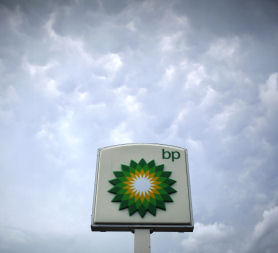The end of cheap oil?
 Alex Thomson
Chief Correspondent
Alex Thomson
Chief Correspondent
The BP oil well may no longer be spilling oil into the Gulf of Mexico, but the story is far from over. Alex Thomson writes on the true cost of the disaster.

Deepwater Horizon is now capped.
It is an ex-oil well as of mid-September 2010 but the debris of the disaster lying 5000 feet down on the sea floor of the Gulf of Mexico are as nothing compared to the rubble surrounding British Petroleum.
For so long, so powerful – the essence of Big Oil – BP was a true global economic titan with numbers that would shame the GDPs of many nation states across the planet. Its preeminent, unassailable position made it a sure bet for shareholders year in year out, and a mainstay of Britain’s pension funds by virtue of that stability.
Much of that, now either gone or seriously damaged. Swept away by the Deepwater blow-out. Shareholder confidence, deeply eroded. Corporate image tarnished for the foreseeable future. Personal careers wrecked. The entire future of deepwater oil exploration cast into a different light. And US lawyers in the compensation industry kept busy for many years to come.
Our coverage of all this began obviously enough with a marine disaster and threatened environmental catastrophe. But then the scale soon broadened into the open war between Capitol Hill and BP. Thence into questioning the entire basis of our insatiable oil thirst taking humanity deeper and deeper into the earth’s crust in search of new fields.
Cheap oil is either gone or going very, very soon now – so the questions opened up by the blowout could not be more profound in terms of the future of energy on the planet.
Cheap oil is either gone or going very, very soon now
On April 20th an explosion caused a fireball visible from 35 miles away as mud, seawater and methane case were forced up the well risers at immense pressure and velocity. Eleven people were killed. Two days later the entire rig sank into 5000 feet of seawater . The greatest oil disaster in US history then unfolded for five months.
The only good news in all this was that the bulk of millions of gallons of crude remained in the Gulf in those deep waters. But the downside to that is that nobody knows what the long term effect of this might be.
Ashore the story quickly became a political firestorm. A US president, relatively new to the job saw Barak Obama desperate to avoid the Bush disaster on the Gulf Coast over Hurricane Katrina. Obama arrived on the coast, again and again. He hollered at BP. The rhetoric became ever more brittle, tinged with anti-British sentiment at times.
Against this BP embarked on one of the worst examples of incompetent PR in industrial history. Its hapless boss Tony Hayward and its press team at first played it all down in terms of the blow-out. Then tried to blame the contractor Transocean (not without some justification it might be said). But the impression was of an industrial global giant trying to blame anybody but itself and its mixed record on rig safety and environmental protection.
Things reached a nadir when BP CEO boss Tony Hayward remarked on TV that “I want to get my life back” as if the Deepwater disaster were an irritation to his schedule and life, instead of an industrial disaster which had taken 11 lives.
He didn’t seem to get it. BP didn’t seem to get it. Its share price tumbled. The biggest losses in British corporate history would shortly be coming from a stunned City of London. Hayward’s days were numbered. Though that did not stop him continuing to be foot in mouth on Capitol Hill when testifying to enraged senators and congressmen – and off it as well.
And out of all this we are suddenly into the news of a new deepwater oil rush. This time it is in the pristine clean arctic waters off Greenland. Deepwater horizon now hangs like a spectre over all of this. Question…anxieties…lessons learned from the Gulf…all of this piling up and putting (clearly legitimate) pressure on the oil exploration companies to clean up their act.
And out of all this we are suddenly into the news of a new deepwater oil rush
So after a five month long catastrophe there are now, quite rightly, more questions then ever about the safety issues of winning oil from fantastic depths.
Oil companies remain extremely good at talking up finds, reserves and potential fields out there for years to come. What they are very, very poor at is informing the public that all this oil will not be cheaply won even had they been allowed to go on cutting corners as they had before Deepwater.
If Deepwater has one legacy, it is as the epitaph for the passed era of cheap crude.